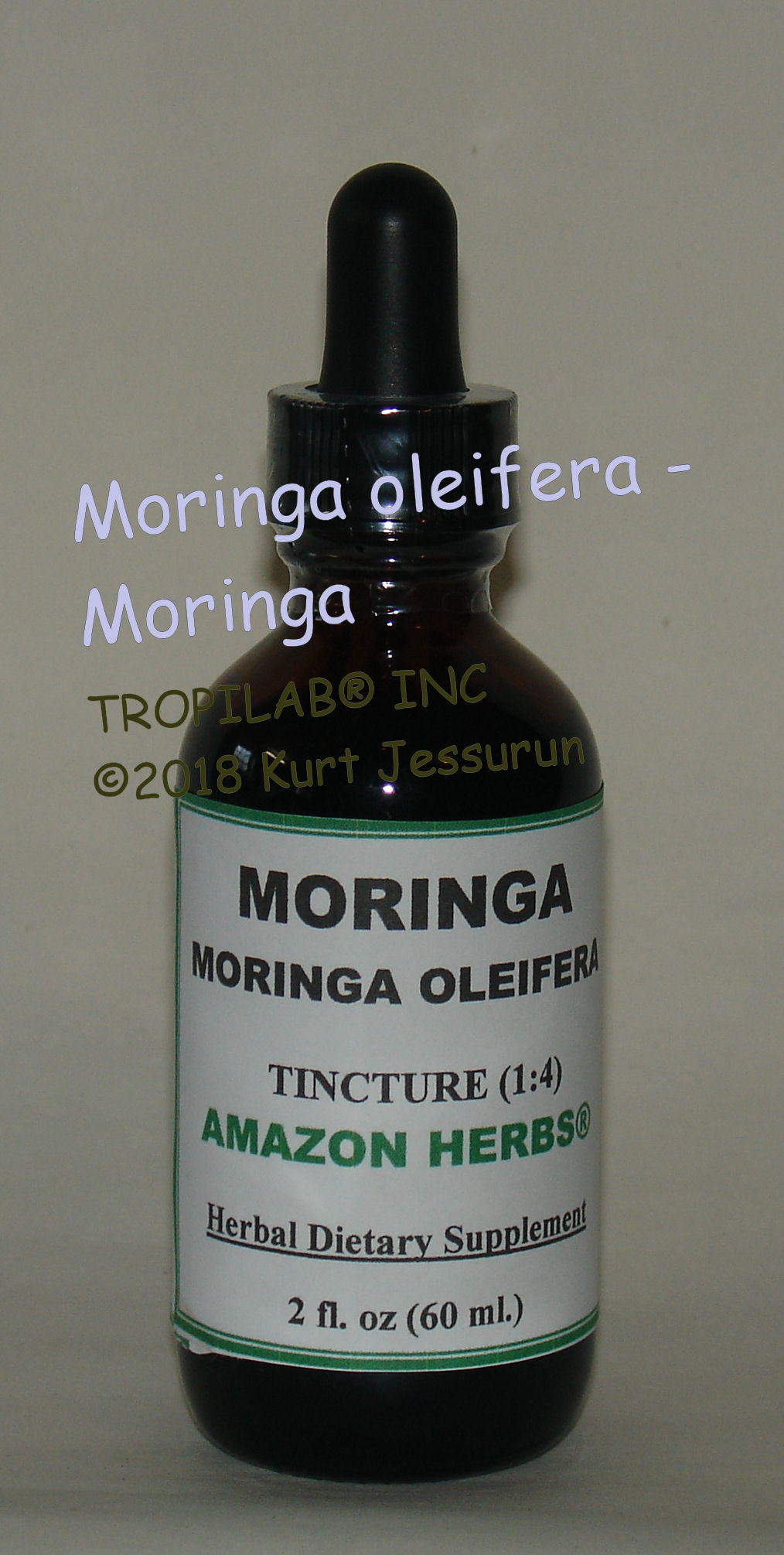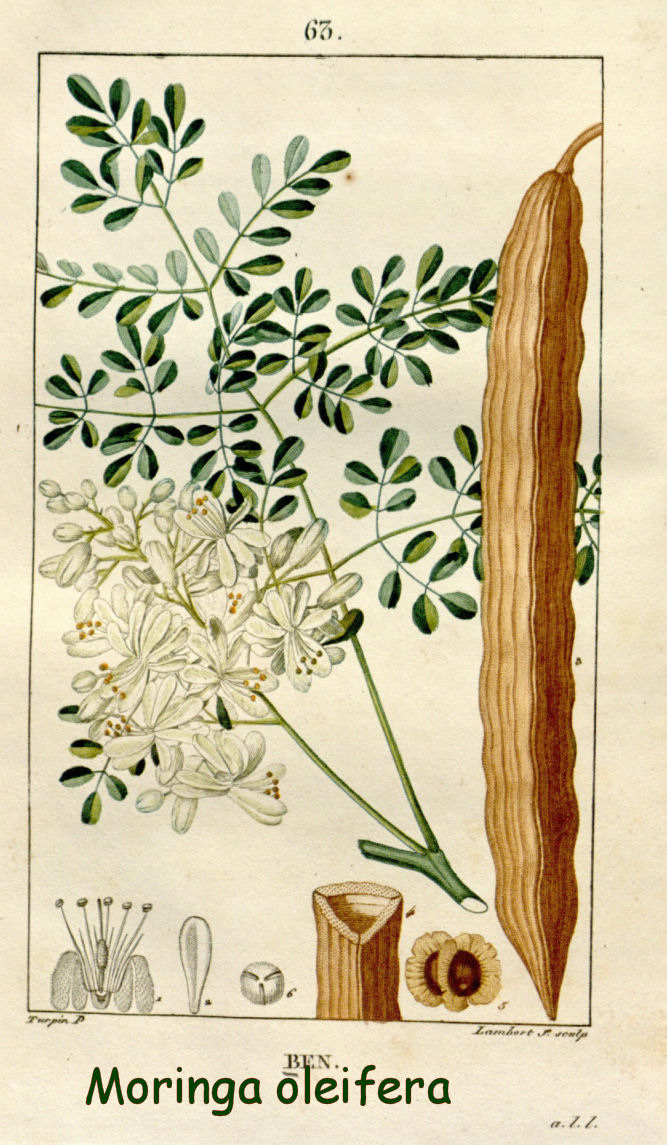Overview

Moringa, aka Miracle plant, is a fast-growing, drought-resistant tree, originally from
India but now growing abundantly in South America.
This plant has been known for many centuries for its many health benefits.
All parts can be used as food but they also has medicinal applications; uses include as an antiseptic and treatment
of rheumatism, venomous bites, obesity, anemia, cancer, diabetes, high blood pressure, epilepsy, reduce cholesterol,
many other ailments and diseases.
TROPILAB uses only the leaves and pods for extraction.
The plant contains many antioxidants (due to high amounts of polyphenols) and anti-inflammatory compounds
(due to flavonoids, phenolic acids and isothiocyanates).
Other activities are: anticancer, antiviral, anticonvulsant, antileishmanial and antispasmodic.
Constituents
A source of natural vitamins (A, B1, B2, B3, B6, B7, C, D, E); minerals (calcium, copper, iron,
potassium, magnesium, manganese, chromium, phosphorus and zinc), quercetin, alkaloids, saponins, tannins, steroids,
phenolic acids, glucosinolates, flavonoids, terpenes chlorogenic acid and proteins.
Pharmacology
 Moringa provides a rich and rare combination of zeatin, quercetin, beta-sitosterol,
caffeoylquinic acid and kaempferol. In addition to its compelling water purifying powers and high nutritional value, M.
oleifera is very important for its medicinal value.
Moringa provides a rich and rare combination of zeatin, quercetin, beta-sitosterol,
caffeoylquinic acid and kaempferol. In addition to its compelling water purifying powers and high nutritional value, M.
oleifera is very important for its medicinal value.
Moringa species contain various phyto-constituents.
About 110 compounds are identified; Moringa genus has high antioxidant activity (due to its high content of flavonoids).
Most common flavonoids of the genus are rutin, quercetin, rhamnetin, kaempferol, apigenin and myricetin.
Moringa contain abundant glucosinolates (benzyl glucosinolate).
Nutritional Values
9 times protein of yogurt, 17 times the calcium in milk, 12 times the vitamin C of oranges,
15 times the potassium of banana, 10 times the vitamin A of carrot.
Increasing breast milk production
Taking 250 mg of a specific moringa supplement (Natalac) daily after childbirth may increase breast milk production.
Asthma
May reduce asthma symptoms and severity of asthma attacks in adults.
Anticancer; The main pathway for the anticancer activity of Moringa species is by inhibiting proliferation through
apoptosis (programmed cell death).
Anti-tumor and anti-cancer activities are partly due to the compound niaziminin..
Dosage
Tincture: 1- 3 full dropper daily.
Precaution
No known side effects and interactions; however, do not use if pregnant or nursing.
Reference
A review on phytochemistry and pharmacology of Moringa oleifera leaves (Moringaceae).
Basile BS Konmy, Pascal Abiodoun Olounladé, Sanni-yo Doko allou, Erick Bertrand V Azando and Sylvie Eliane G Hounzangbé-Adoté
International Journal of Pharmcognosy.
Medicinal uses and pharmacological properties of Moringa oleifera.
P Sudhir Kumar, Debasis Mishra, Goutam Ghosh, Chandra S. Panda.
Moringa Genus: A Review of Phytochemistry and Pharmacology.
Nur Zahirah Abd Rani, Khairana Husain and Endang Kumolosasi
Moringa oleifera: a food plant with multiple medicinal uses.
Anwar F, Latif S, Ashraf M, Gilani AH.
Phytochemistry and pharmacological activities of Moringa oleifera.
Toma and Deyno; International Journal of Pharmcognosy; Vol. 1(4); pp. 222-231; 2014.
The above presentation is for informational and educational purposes only.
It is based on scientific studies (human, animal, or in vitro), clinical experience, or traditional usage.
For many of the conditions discussed, treatment with prescribed (RX) or over - the - counter medication (OTC) is also available.
Consult your doctor, practitioner, and/or pharmacist for any health problem and before using dietary
supplements or before making any changes in prescribed medications.
|

